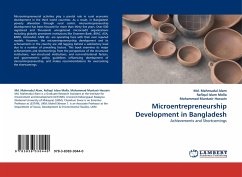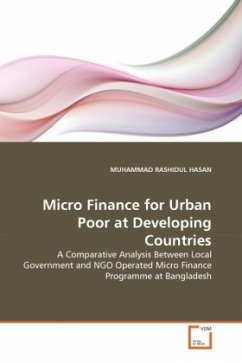
Microentrepreneurship Development in Bangladesh
Achievements and Shortcomings
Versandkostenfrei!
Versandfertig in 6-10 Tagen
32,99 €
inkl. MwSt.

PAYBACK Punkte
16 °P sammeln!
Microentrepreneurial activities play a pivotal role in rural economic development in the third world countries. As a result, in Bangladesh poverty alleviation through rural centric microentrepreneurship development has been focused for more than thirty five years. Over 600 registered and thousands unregistered microcredit organizations including globally prominent institutions like Grameen Bank, BRAC, ASA, BARD, ActionAid, CARE etc. are operating here with their own reputed models. However, the microentrepreneurship development and its achievements in the country are still lagging behind a sat...
Microentrepreneurial activities play a pivotal role in rural economic development in the third world countries. As a result, in Bangladesh poverty alleviation through rural centric microentrepreneurship development has been focused for more than thirty five years. Over 600 registered and thousands unregistered microcredit organizations including globally prominent institutions like Grameen Bank, BRAC, ASA, BARD, ActionAid, CARE etc. are operating here with their own reputed models. However, the microentrepreneurship development and its achievements in the country are still lagging behind a satisfactory level due to a number of prevailing factors. This book examines its major achievements and shortcomings from the perspectives of the structured institutions, non-structured institutions, and non-institutional factors, and government s policy guidelines influencing development of microentrepreneurship, and makes recommendations for overcoming the shortcomings.












